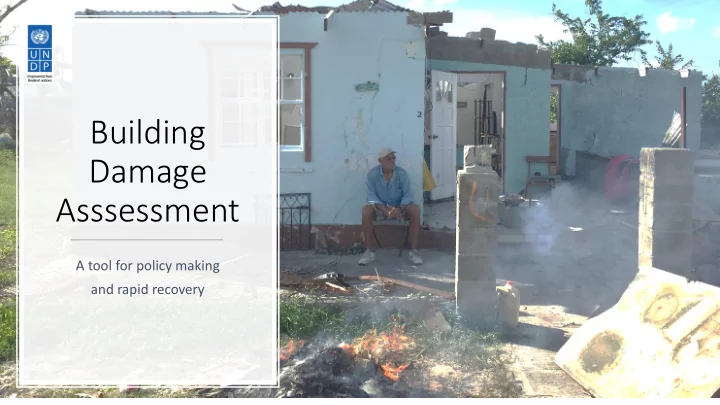

Building Damage Asssessment A tool for policy making and rapid recovery
Technical expertise and Digital technology
The methodology Inspectors • Questionnaire • Sectorization / zoning • App • Team development • Data collection formation • Training Technical Field definition assessments Reporting • Decisions • Data verification • Data analysis • Actions • Visualization • Recovery • Reports Programs and Data policies Management
2. IN INFORMATION AVAILABLE
Roofs, ceilings, floors and walls
And more relevant information
3. COLOR TAGGING
Green: minimal or no damage
Yellow: Minor repairs required
Orange: Major repairs required
Red: Building destroyed
Grey: Unclear
4. . DATA MANAGEMENT & & REPORTING
Data exportable, sharable and compatible
5. . ANALYSIS (few examples)
Building damage Other Minimal damage Destroyed Minor damage Major damage
Roof damage 25%-49% roof damage Minimal roof damage 50%-75% roof damage Over 75% roof damage
Damage by building size Extra Small - Less than 200 ft2 Small - 200 ft2 to 500 ft2 Medium - 500 ft2 to 1200 ft2 Large - 1200 ft2 to 2500 ft2 Extra Large - Over 2500 ft2 % of rood needs relate to extra small, small and medium buildings.
Construction techniques VS 70% damage 20% damage
Ongoing repairs (permanent housing)* Yes *Plastic sheeting and other temporal/transitional solutions are not considered as repairs in No this assessment.
Public buildings – level of f damage
Debris to be managed • Volume • Location • Heavy equipment required • Storage capacity • Transportation
Color tag (by district)
Planning and Budgeting Type Cost/unit Budget Damage Materials Size required
6. WAY FORWARD
Quick impact – families back to SAFE homes Green buildings Yellow buildings • Minimal fixes • Minor repairs • Reinforcements • Installation of galvanized • Inexpensive • Minor rafter replacement • Fast • Prioritization (possible criteria): • Government buildings • Essential personnel • Business • Houses with occupants
Reconstruction Orange buildings Red buildings • Major repairs • Debris management • Reinforcements • Disaster resilient structures • Good quality materials • Location • Time frame • Vulnerabilities
Long term view • Building codes (use) • Urban planning • Resilience and Climate Change adaptation • Adequate financing • Livelihoods • Sustainable development
Thank you for the attention a house is NOT a home ugo.blanco@undp.org
Recommend
More recommend